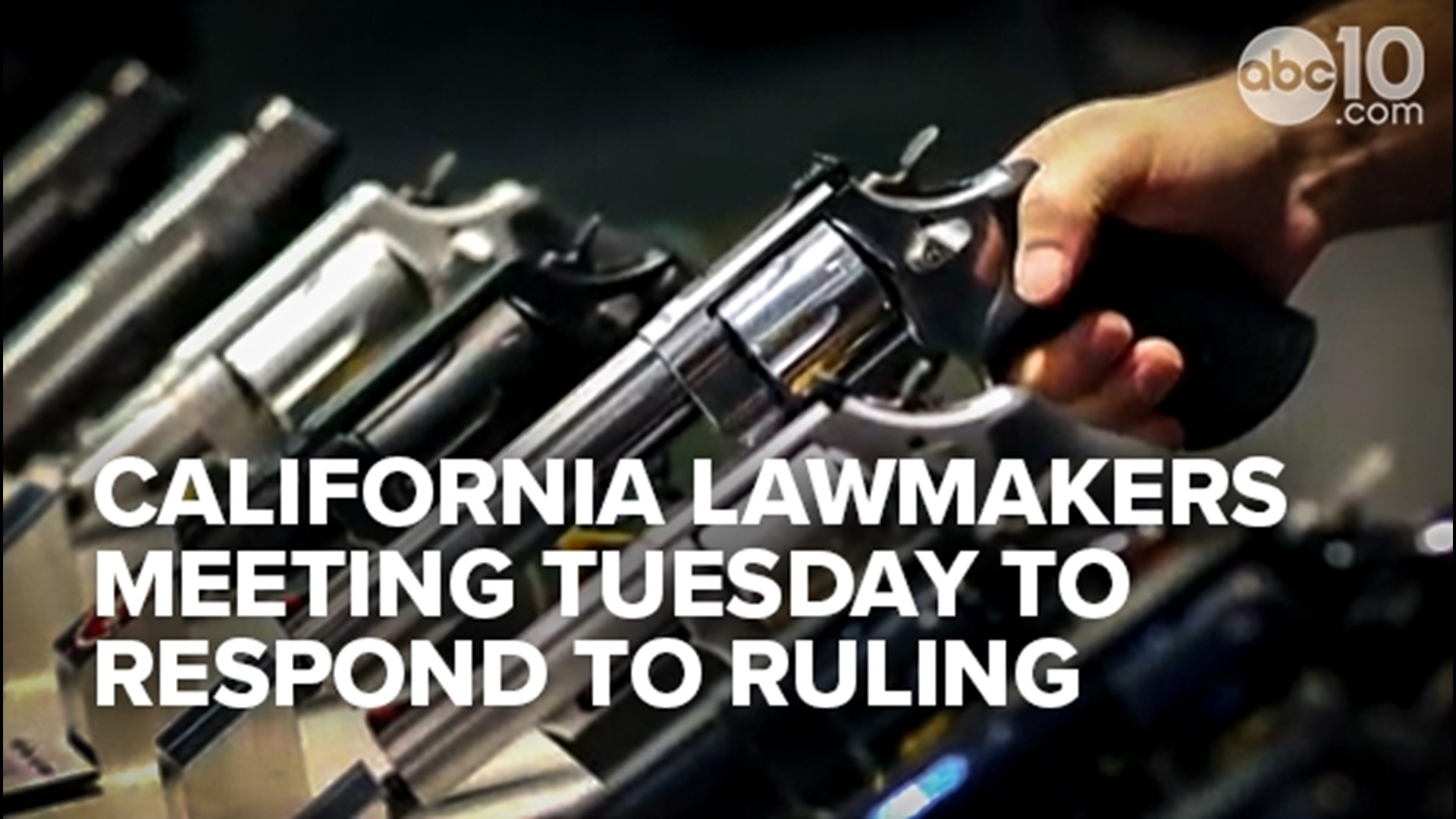SACRAMENTO, Calif. — California legislators will consider a new law within days to keep dangerous people from carrying concealed weapons in public, Gov. Gavin Newsom and his top law enforcement official said Thursday after a U.S. Supreme Court decision invalidated the most populous state's current law.
The high court struck down a New York law requiring that people seeking a license to carry a gun in public demonstrate a particular need, such as a direct threat to their safety. California is among a half-dozen states with a similar requirement.
Newsom in a tweet called the ruling a "dangerous decision from a court hell bent on pushing a radical ideological agenda and infringing on the rights of states to protect our citizens from being gunned down in our streets, schools, and churches."
Attorney General Rob Bonta said the high court's ruling still leaves states with the right to limit concealed carry permits to those who meet legal standards to safely possess firearms.
Lawmakers are amending legislation to expand the qualifications people must have to obtain a concealed carry permit, and to expand the places where no weapons may be carried. The revised bill will get its first hearing Tuesday, and lawmakers hope to send it quickly to Newsom for his signature.
Sam Paredes, executive director of Gun Owners of California, said he is "1,000% confident" that based on the high court's ruling the new legislation "will be thrown into the waste bin of unconstitutional laws."
Bonta conceded the ruling clearly overturns California's law requiring people to give a good reason for carrying a concealed weapon. But he said the decision still allows the state to require things like an assessment of a person's dangerousness.
He said that will be "robust," by examining things like arrests and criminal convictions, restraining orders "and other publicly available information that might suggest that a person poses a danger to themselves or to others."
The state will require background checks, including with fingerprinting, as well as firearms training and a mental health assessment, Bonta said. Many of the precautions already are allowed under current law.
The Supreme Court decision "has made it clear that states like California still have many venues to prevent senseless death and keep our families safe from gun violence, and we're going to use those avenues in California," Bonta said.
Moreover, he said the decision still allows states to prohibit concealed weapons in certain sensitive areas like parks, amusement parks, sporting venues and other areas "of significant public congregation."
Attorney Chuck Michel, president of the California Rifle and Pistol Association, predicted Democrats pushing the bill are "going to declare every place they think of as a 'sensitive place.'"
"These are the kind of games that they're going to play to frustrate the spirit of the ruling," he said.
Paredes said he expects a flood of gun owners to apply for concealed carry permits, particularly in the San Francisco Bay Area and greater Los Angeles region, "and just dare the permitting authorities to go against this decision."
San Francisco Sheriff Paul Miyamoto said his office already saw a jump in applications — 22 by Thursday afternoon, compared to two pending applications submitted since the beginning of the year. Miyamoto said his office hasn't issued any permits since January 2020, when he was sworn in.
"We're going to see a consistent interest in applying for concealed weapon carry because of the current climate that we're in and people's perception that it's unsafe in the community," he said. "My only concern would be more guns out in the community doesn't mean it's safer."
John Parkin, co-owner of Coyote Point Armory in the San Francisco Bay Area city of Burlingame, said the court's decision removes the sheriff's ability to subjectively determine whether someone has a valid reason for a concealed carry permit.
"The people in San Francisco will now have the ability to go and apply for a license and actually not get rejected by a good cause statement that doesn't meet the criteria of the elected sheriff," he said, adding the ruling " will even out what happens between states that have more strict rules against states that have more normal Second Amendment federal rules that they use."
Nearly two-thirds of California's 58 counties already make it relatively easy to obtain concealed carry permits but many are in rural areas. Michel's association plans to immediately update a lawsuit already under consideration by the 9th U.S. Circuit Court of Appeals challenging Los Angeles County's concealed weapon permitting policy.
Deputy Grace Medrano, a spokesperson for Los Angeles County Sheriff Alex Villanueva, said in a statement he has already issued more permits "as violent crime has risen within Los Angeles County."
"The Sheriff recognizes the threats to the residents have increased and has responded accordingly," Medrano said.
Officials in both San Francisco and the city of Los Angeles said they are reviewing the Supreme Court's decision and will seek a legal opinion from Bonta's office.
Newsom and Bonta are backing a bill by Democratic state Sen. Anthony Portantino, who earlier this month amended pending legislation to update California's concealed carry permit requirements. Bonta and Portantino said it will be further amended before Tuesday's hearing to conform with details in the Supreme Court ruling.
Bonta said the bill could go to Newsom by month's end, before lawmakers adjourn for a monthlong summer recess. If two-thirds of lawmakers approve the bill it would take effect immediately instead of in January, but Bonta said those details still are being worked out.
Paredes said the bill "will do nothing but complicate the process and increase the costs of obtaining a permit by law-abiding citizens."
____
Associated Press writers Stefanie Dazio in Los Angeles, Olga Rodriguez in San Francisco and Haven Daley in Burlingame contributed to this report.
WATCH ALSO:



















